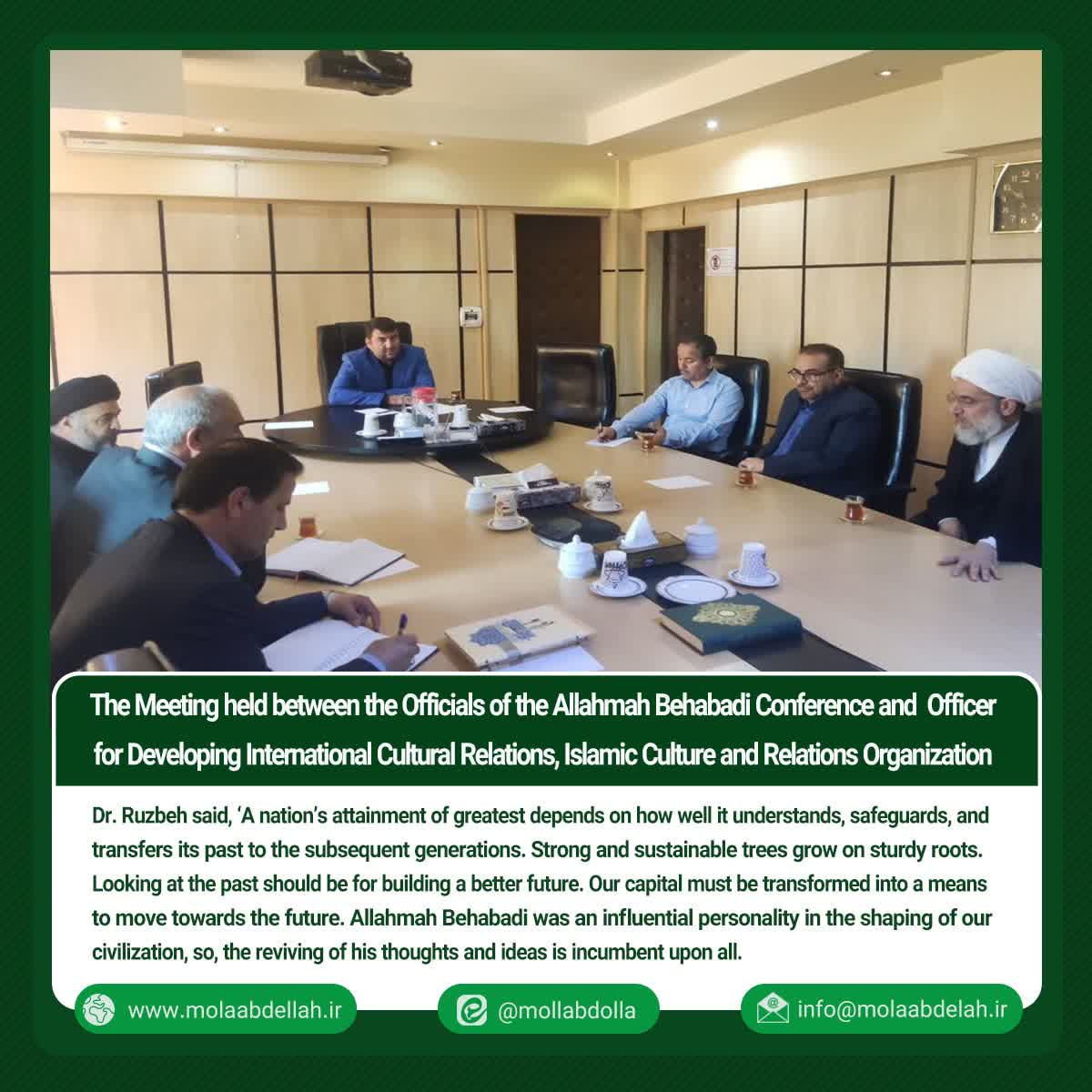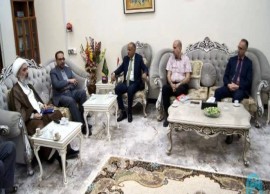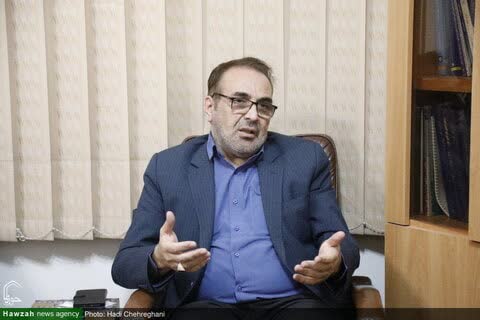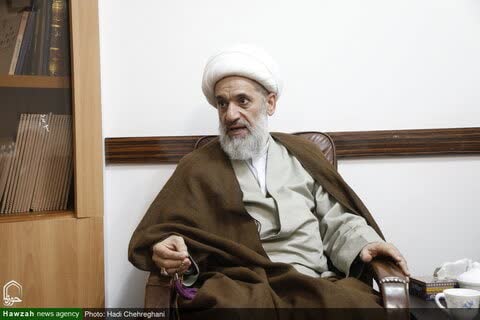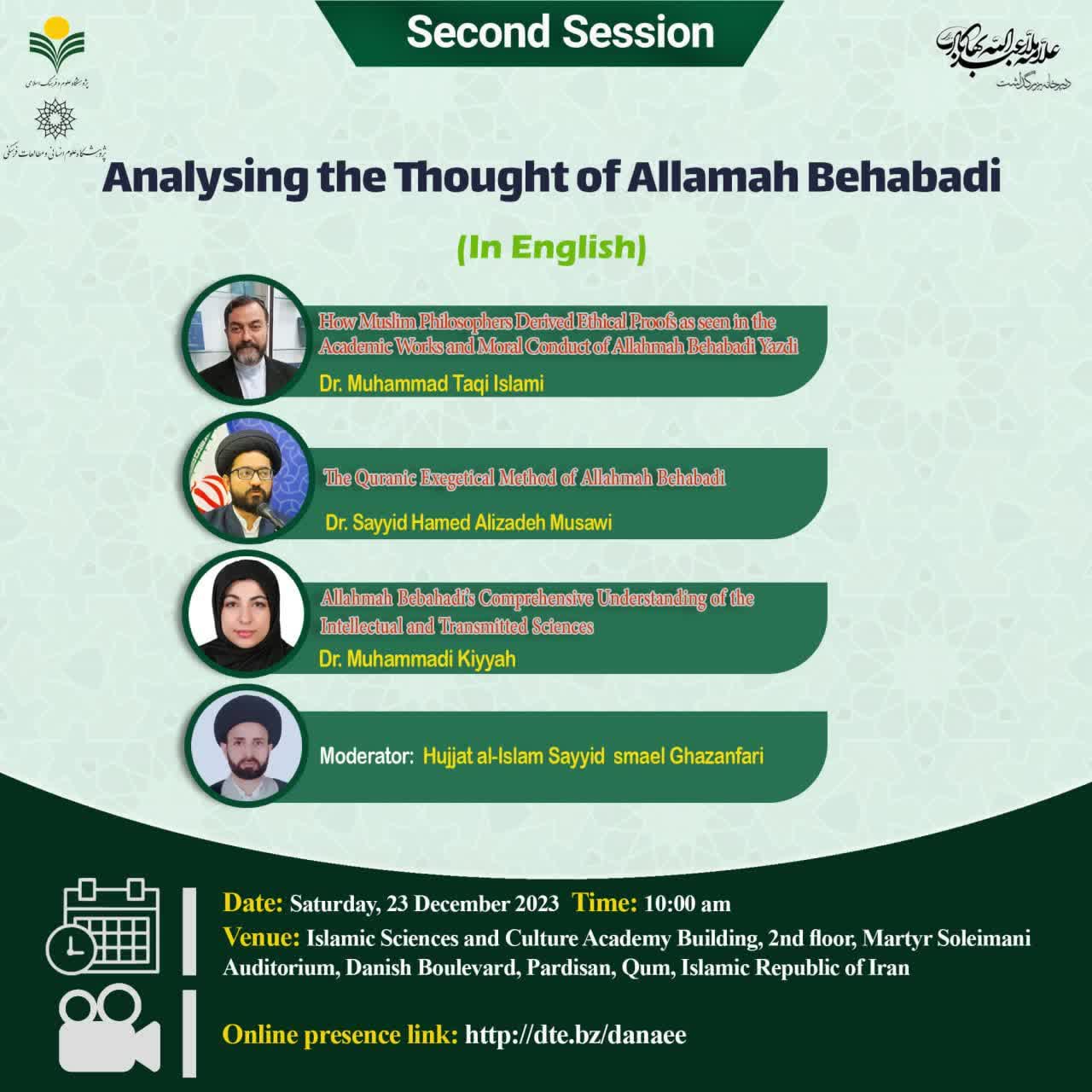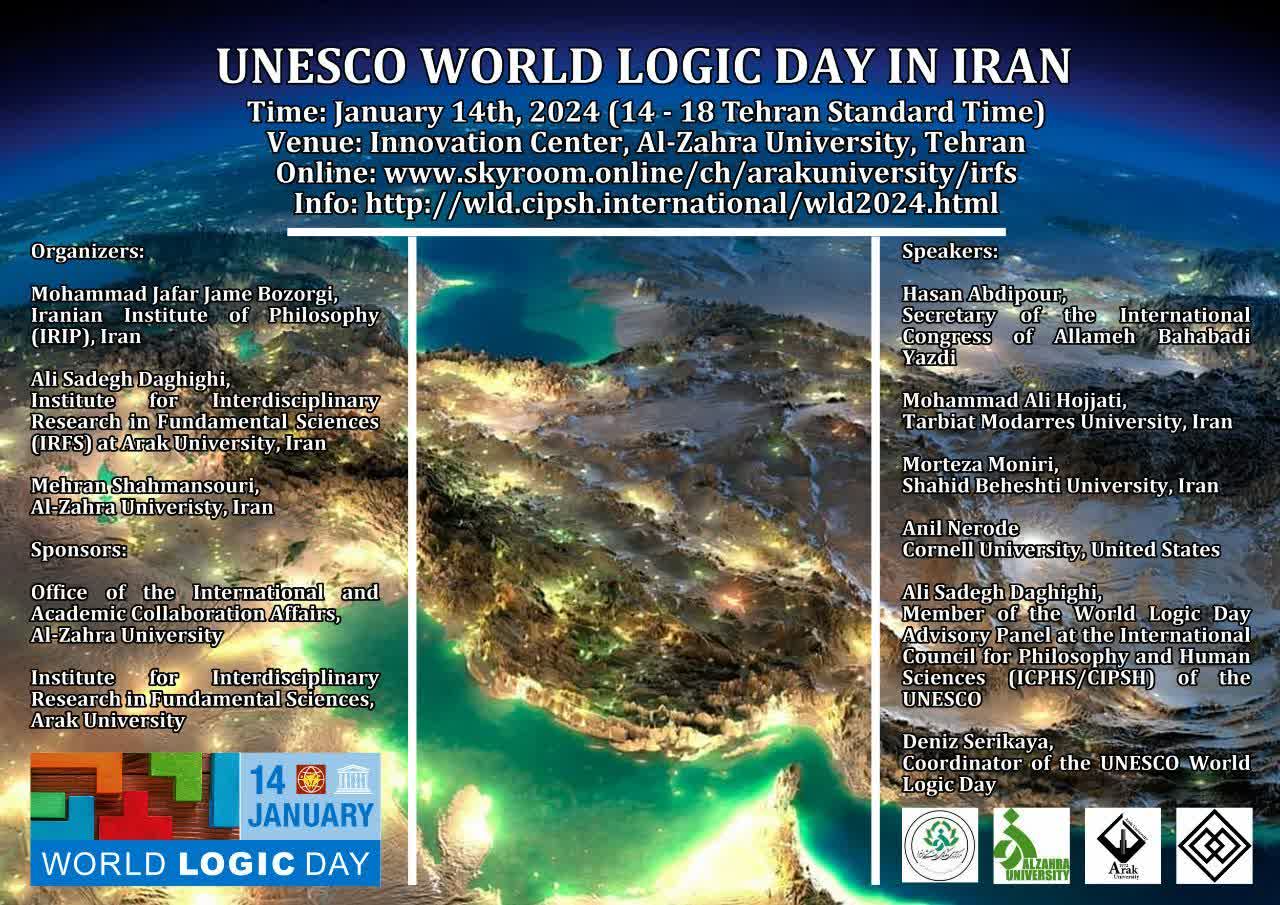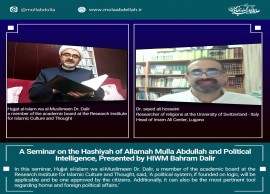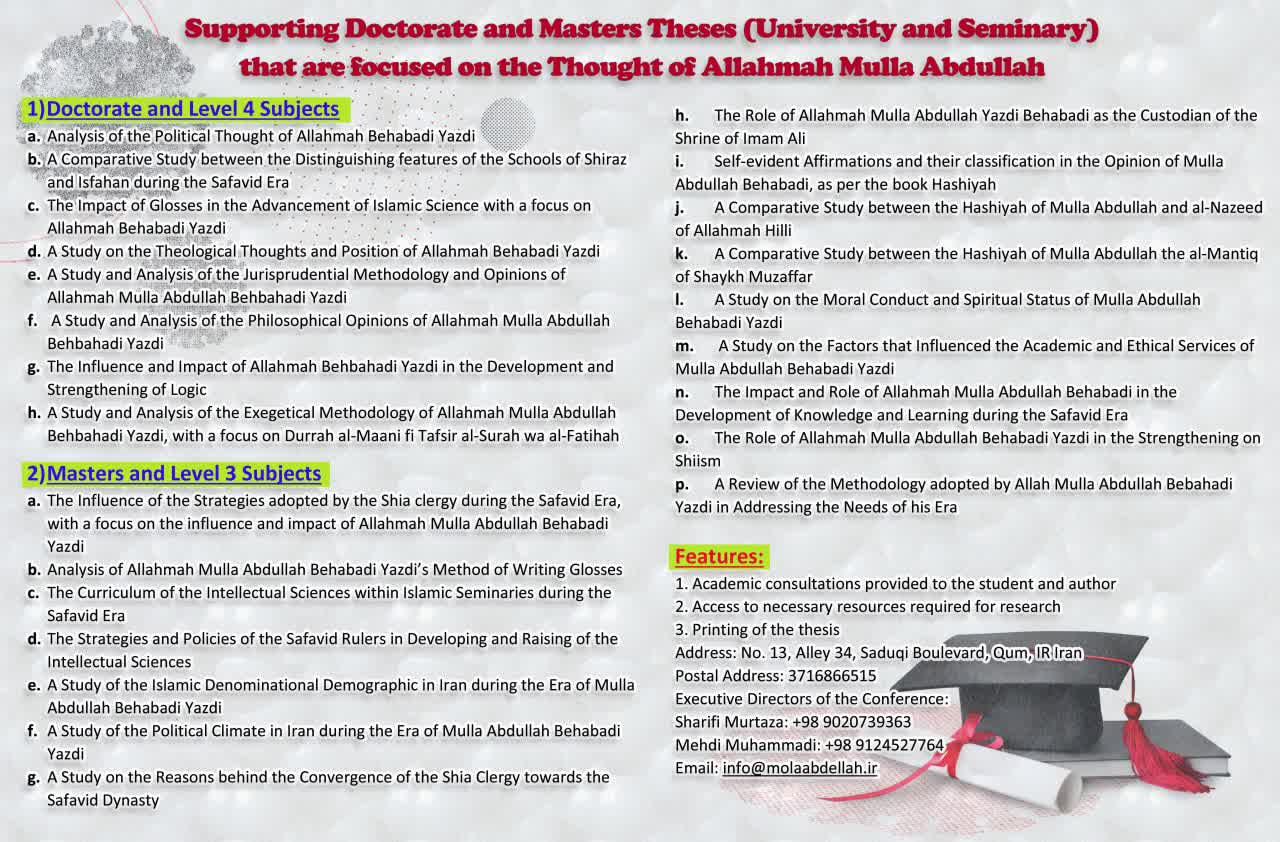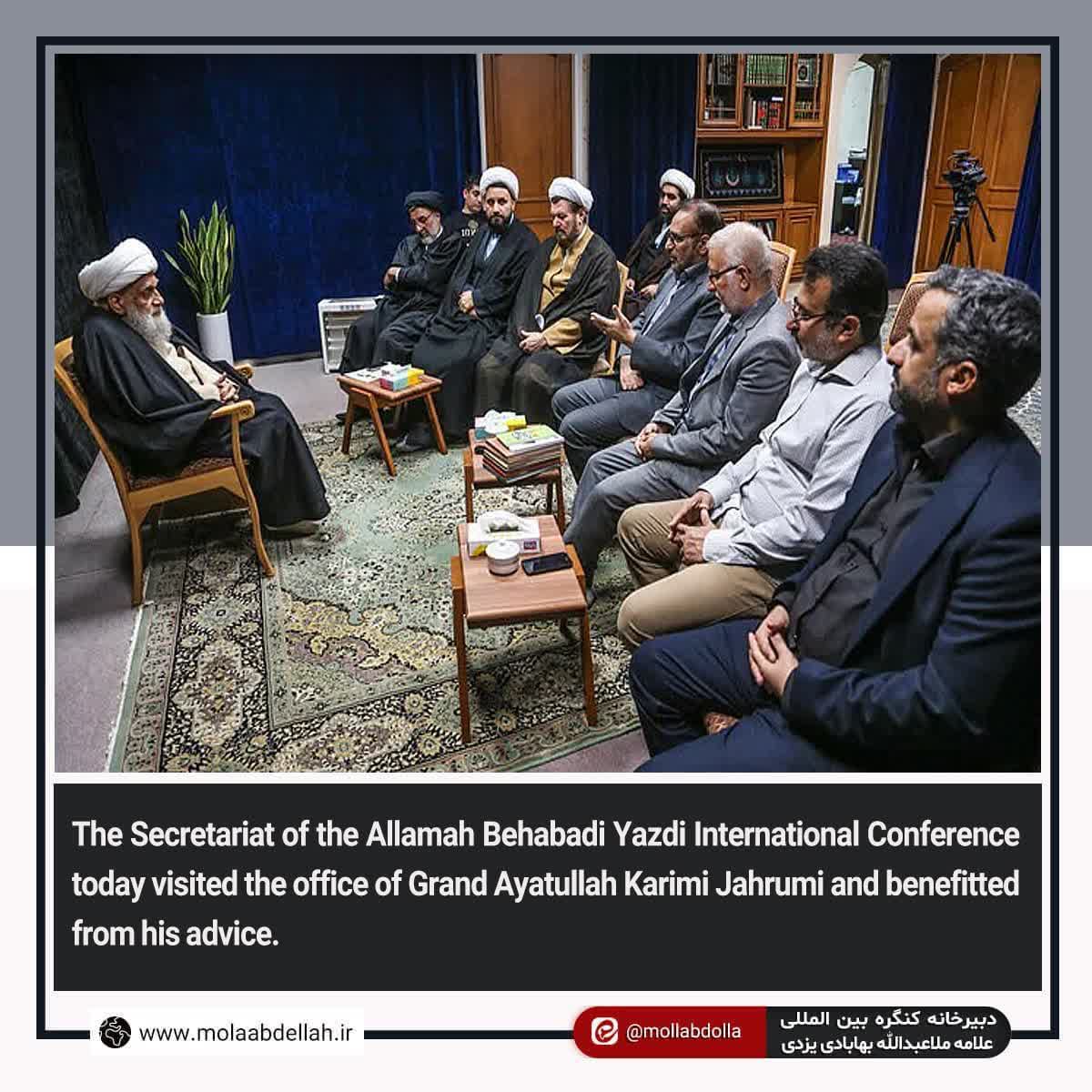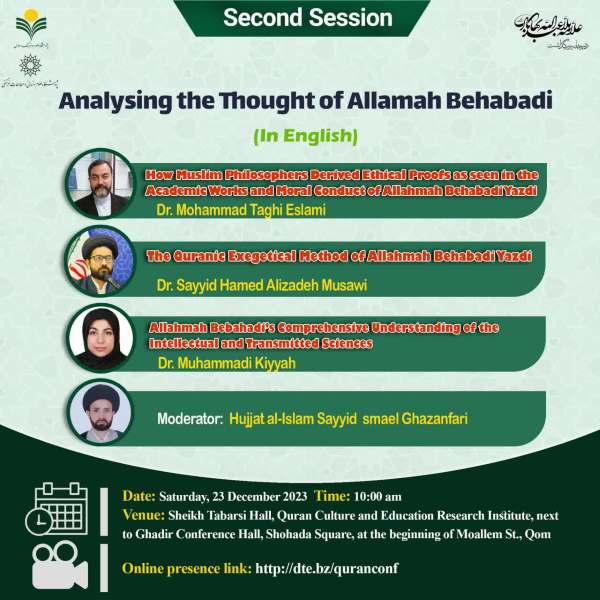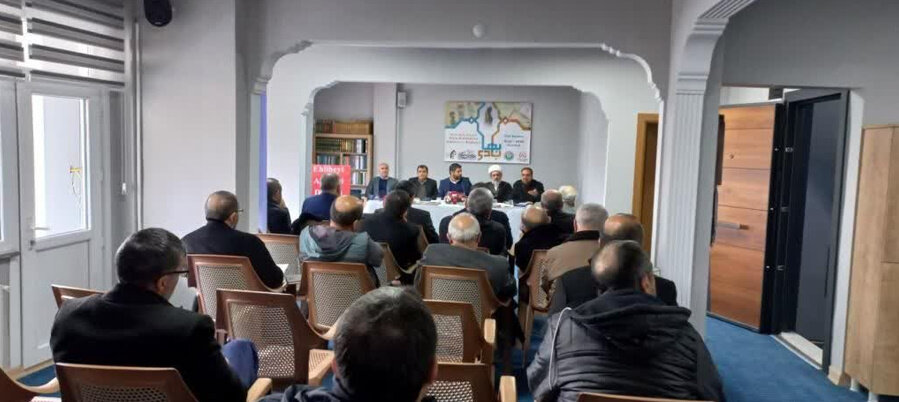ꜤAllāmah Ḥakīm Behābādī
Introduction
Human thought and knowledge has continually been shaped over the course of history, and has developed and advanced through its ebbs and flows. In reality, the history of knowledge is a linked chain consisting of diligent and erudite individuals who, with every ounce of their being, made efforts to impact and immortalize the intricacies of their thought. For this reason, present and contemporary thought owes a great deal to the activities and efforts of those who came before. Hence, the honoring of the past scholars and intellectuals within any academic discipline is in reality an honoring of those preceding thoughts.
In addition, the moral conduct and academic endeavors of these esteemed personalities has immense potential to bring about fruitful and lasting results for both the Islamic Seminary and the laity at large, if hoisted as an example to follow. Therefore, studying the lives of previous scholars and highlighting the potentials that their academic and ethical endeavors could have, is one of the most beneficial ways in acquiring the manner of how to correctly attain knowledge and spirituality.
ꜤAllāmah Mullā ꜤAbd Allāh Behābādī Yazdī is one of the prides of our ancient and celebrated land. It was he who, because of his great efforts in the 10th century Hijri, achieved unheralded success in the promotion of learning and teaching during that period. In addition to his teaching and studying at the Islamic seminaries of Iṣfahān, Shirāz and Najaf, he was also instated as the treasurer of the Blessed Shrine of Imām ꜤAlī (as) by the Safavid emperor of his time.
Anecdotes[1] that have reached us about this illuminous sage indicate the high spiritual station he possessed. Moreso, these anecdotes also allude to this important reality, which is that his academic and social responsibilities did not hinder him from attaining spiritual illuminations.
On one of his visits to the province of Yazd, the Leader of the Islamic Republic, Ayatullah Sayyid Ali Khamenei, said the following in praise of Mullā ꜤAbd Allāh Behābādī Yazdī:
Many erudite and learnt individuals in the fields of Islamic Sciences, Quranic exegesis, mathematics, jurisprudence and ḥadīth have risen from this area that, although arid, is very fertile for the development of human capabilities. Yazd was called Dār al-ꜤIbadāh (Home of Worship), however, it would not be an exaggeration if it was also called Dār al-ꜤIlm (Home of Knowledge).
For example, consider the writer of the book al-Ḥāshiyah, Mullā ꜤAbd Allāh, who was from your city, Behābād. He was the teacher of both Shaykh Bahā’ī and the author of al-Madārik, who, as you all know, is regarded very highly amongst our contemporary jurisprudents. His teacher in the intellectual sciences was this very Mullā ꜤAbd Allāh. This sage [i.e. Mullā ꜤAbd Allāh], in contrast to what some on the periphery may think, was right at the heart of political activity. He was instated as the custodian of the Shrine of Imām Alī (as) by the Safavids. The situation at that time was such that whoever was appointed as the custodian and treasurer of the Shrine of Imām Alī (as) was in fact the head of Najaf. Mullā ꜤAbd Allāh, the author of al-Ḥāshiyah, was the governor of Najaf and what is astonishing is that governorship of this city stayed within the family of Mullā ꜤAbd Allāh for many years, right up until the time of Shaykh Kāshif al-Ghītā’. After him [i.e. Shaykh Kashif], Najaf was then governed by the Mulālī family.
Education and Teachers
Mullā ꜤAbd Allāh Yazdī was the classmate of Muqaddis Ardabīlī in the city of Isfahān. Both of them were the students of Jamāl al-Dīn Mahmūd (who was a student of ꜤAllāmah Dawānī). The destiny of these two classmates was such that Muqaddis Ardabīlī took the path of jurisprudence and asceticism, while Mullā ꜤAbd Allāh took the path of the classical liberal arts. He reached such a position that he was regarded as one of the leading teachers and scholars of these sciences during the 10th century Hijri. In addition, the glosses that were written by these two scholars on the classical books present during their day were used as textbooks for many years within the Islamic Seminary.
In one of his treatises, which he wrote on the Sharh Alfiyyāh of Shahīd Awwal, Mullā ꜤAbd Allāh praises and honors Muḥaqqiq Karakī on numerous occasions and frequently mentions him saying, ‘He is my shaykh and teacher.’
Teaching and Students
After completing his education and attaining many forms of expertise, Mullā ꜤAbd Allāh Yazdī became the Ꜥallāmah of his day, no one matched him in his knowledge, God-consciousness and virtue. For many years he busied himself with teaching, during which time many great thinkers and intellectuals were trained in his school, such as:
- Shaykh Bahā’ī (953 AH – 1030 AH), renowned Shī’ah mystic, philosopher and scientist
- Shaykh Ḥasan ibn Zayn al-Dīn ꜤĀmulī (the son of Shahīd Thanī), author of the book al-MuꜤālim
- Sayyid Muḥammad ibn ꜤAlī ꜤĀmulī, famously known as the author of the book al-Madārik
The Collective Works of ꜤAllāmah ꜤAbd Allāh Behābādī Yazdī
- His written works
- Those re-published by the Secretariat of the International Congress on ꜤAllāmah Behābādī Yazdī:
- al-Tashkīk (A philosophical text
- al-Ḥāshiyah Ꜥalā Ḥāshiyah Sharh al-Tajrīd
- Irshād al-Izhhān (a jurisprudential text in two vols.)
- Translation and Exposition of the book Durrah al-MaꜤānī
- Those re-published by the Secretariat of the International Congress on ꜤAllāmah Behābādī Yazdī:
- Works regarding ꜤAllāmah ꜤAbd Allāh
- Shenākht Nāmeh (Biography)
- The academic and practical life of ꜤAllāmah Mullā ꜤAbd Allāh Behābādī Yazdī
- Collection of Articles in three vols.
- Collection of Interviews
- Two Special Edition Publications
- Works that are in the process of being published:
- His Written Manuscripts:
- al-Durrah al-Sanīyyah
- Ḥāshiyah Ꜥalā al-Istibṣār
- Sharh al-QawāꜤid in jurisprudence
- Sharh QawāꜤid al-Aḥkām
- al-Kharāzah fī Sharh al-ꜤIjālah
- Ḥāshiyah Ꜥalā Tahzīb Dawānī
- Ḥāshiyah Ꜥalā Tahzīb al-Manṭiq (Arabic)
- Ḥāshiyah Ꜥalā Tahzīb al-Manṭiq (Persian)
- Ḥāshiyah Ꜥalā Tahzīb al-Manṭiq (Ḍābiṭah Ashkāl)
- Ḥāshiyah Ꜥalā Tahzīb al-Manṭiq (not famous)
- al-Tijārah al-Rābiḥah (Exegesis of a Surah and Fātiḥah)
- Tafsīr al-Shahābādī or Ḥāshiyah Ꜥalā Tafsīr Bayḍāwī
- Taḥrīr al-QawāꜤid al-Manṭaqiyyah fī Sharh al-Shamsīyyah
- Ḥāshiyah Ꜥalā Sharīfīyyah Ꜥalā Sharh Muṭawwal
- Ḥāshiyah Ꜥalā Ḥāshiyah Sharīfīyyah
- Ḥāshiyah Ꜥalā Ḥāshiyah Dawānī
- Ḥāshiyah Ꜥalā Sharh Shamsīyyah
- Ḥāshiyah Ꜥalā Khaṭā’ī
- Ḥāshiyah Khiṭābīyyah
- Glosses (Ḥawāshī) on the Ḥāshiyah Tahzīb al-Manṭiq
- Ḥāshiyah Sayyid Shahāb al-Dīn ibn Muḥammad Ḥusaynī Tabrīzī
- Ḥāshiyah from a contemporary scholar
- Ḥāshiyah Sayyid Abū al-Qasīm ibn Sayyid Riḍā Ṭabāṭabā’ī aka ꜤAllāmah Tabrīzī
- Ḥāshiyah Sayyid Muḥammad Ḥasan ibn Sayyid ꜤAbd al-Rasūl Ṭālaqānī Najafī
- Ḥāshiyah Shaykh ꜤAlī ibn Ḥusayn JāmaꜤī ꜤĀmulī
- Ḥāshiyah Muḥsin ibn Muḥammad Ṭāhir Qazwīnī
- Ḥāshiyah Mirzā ꜤAlī Riḍā Tajallī
- Ḥāshiyah Mullā Muḥammad Ḥusayn ibn IsmāꜤīl Yazdī Ardastānī
- Kashf al-Astār
- Ḥāshiyah by an Unknown Author
- Ḥāshiyah Shaykh Ishāq Ḥuwayzī
- Ḥāshiyah Āghā Muḥammad JaꜤfar Kermānshāhī
- Ḥāshiyah Shaykh Ḥasan ibn Muḥammad Ḥasan SharīꜤatmadārī
- Ḥāshiyah Sayyid Muḥammad SaꜤīd Sarrāj
- Ḥāshiyah Sayyid Bahā’ al-Dīn Muḥammad ibn Muḥammad Bāqir Ḥusaynī Mukhtārī Nā’īnī (Died during the beginning of the Afghan strife)
- Ḥāshiyah Shaykh ꜤAbd al-Rahīm
- Ḥāshiyah Mullā ꜤAbd al-Razzāq Lāhījī
- Ḥāshiyah Mirzā ꜤAbd al-Ghaffār
- Ḥāshiyah Mirzā Muḥammad ibn Aḥmad ꜤAlī Qirācheh Dāghī Tabrīzī
- Ḥāshiyah Muḥammad ꜤAlī ibn Qurbān-e-ꜤAlī Ardabīlī
- Ḥāshiyah Mullā Muḥsin ibn Muḥammad Ṭāhir Qazwīnī
- Ḥāshiyah Mullā Muḥsin Tehranī
- Ḥāshiyah Mirzā Muḥammad Tankābanī
- Ḥāshiyah Mirzā Muḥammad Yazdī
- Ḥāshiyah Sayyid Muḥammad Mahdī ibn JaꜤfar Musawī
- Ḥāshiyah Mullā Naẓar ꜤAlī ibn Muḥsin Gīlānī (Amongst the philosophers alive at the end of the 12th century Hijri)
- Ḥāshiyah YaꜤqūb Bakhtiyārī Ḥuwayzi
- His Written Manuscripts:
It should be mentioned that these works, after attaining their manuscripts and re-publishing them, will be printed in the form of the collected works of Ḥakīm Behābādī Yazdī by Inteshārāṭ ꜤAllāmah.
- Works About ꜤAllāmah Behābādī
- The Political Thought of ꜤAllāmah Behābādī
- The publishing of the life of ꜤAllāmah Behābādīin the form of a novel for youth
- Third Special Edition Publication
- Collection of Interviews and Dialogues ( Vol. 2)
[1] Mīrzā Muḥammad Tankābanī narrates in Qiṣaṣ al-ꜤUlamā’ (pg. 174) that when Mullā ꜤAbd Allāh Yazdī entered the city of Isfahān, a part of the night had passed. After seeing the city with his esoteric eye, he turned to his companions and said, ‘ Pack up our things, as we need to leave this city at once! I see a thousand trays of alcohol dispersed throughout this city and I fear that we will not be spared if Allah desires to send down His punishment.’ So his companions packed up their belongings, while he mounted his horse. They had not yet exited the city when dawn began to break. Mullā ꜤAbd Allāh Yazdī again looked at the city with his esoteric eye. He then said to his companions, ‘Return, for I see a thousand prayer mats laid down for the performance of the Night Prayer, this will compensate for the earlier sin.’ He then returned to the place where he was staying previously in the city.

